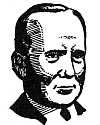 But
Marconi was not satisfied. He still dreamed of sending messages
across the seas; so, in 1901, fifteen years after he began his ex
periments, he set up a receiving station in Newfoundland. The
transmitter was located at Cornwall in southwest England. For weeks, on
a cold, bleak hill-top, swept by gales, he tried to get an antenna into
the air. His box kites and balloons broke loose and were swept out to
sea. But
Marconi was not satisfied. He still dreamed of sending messages
across the seas; so, in 1901, fifteen years after he began his ex
periments, he set up a receiving station in Newfoundland. The
transmitter was located at Cornwall in southwest England. For weeks, on
a cold, bleak hill-top, swept by gales, he tried to get an antenna into
the air. His box kites and balloons broke loose and were swept out to
sea.On December 12, he managed to get a kite, carrying his antenna, 400 feet into the air. Then began a period of waiting - waiting for the signal that was constantly being sent out from Cornwall. At last, he heard something - three faint clicks! He couldn't believe it but it came in again and again, a little stronger. It was the Cornwall signal! Those faint clicks signalled a most dramatic moment - signalled success! His dream had come true! In the years that followed, Marconi and hundreds of other scientists, worked to discover better means of sending and receiving telegraph messages. From this work and the invention of deForest came the radio transmission of voice and music. It is interesting to note that an experiment that started out as a means of telegraphic communication with ships at sea produced, as a by-product, our international concert hall. |








